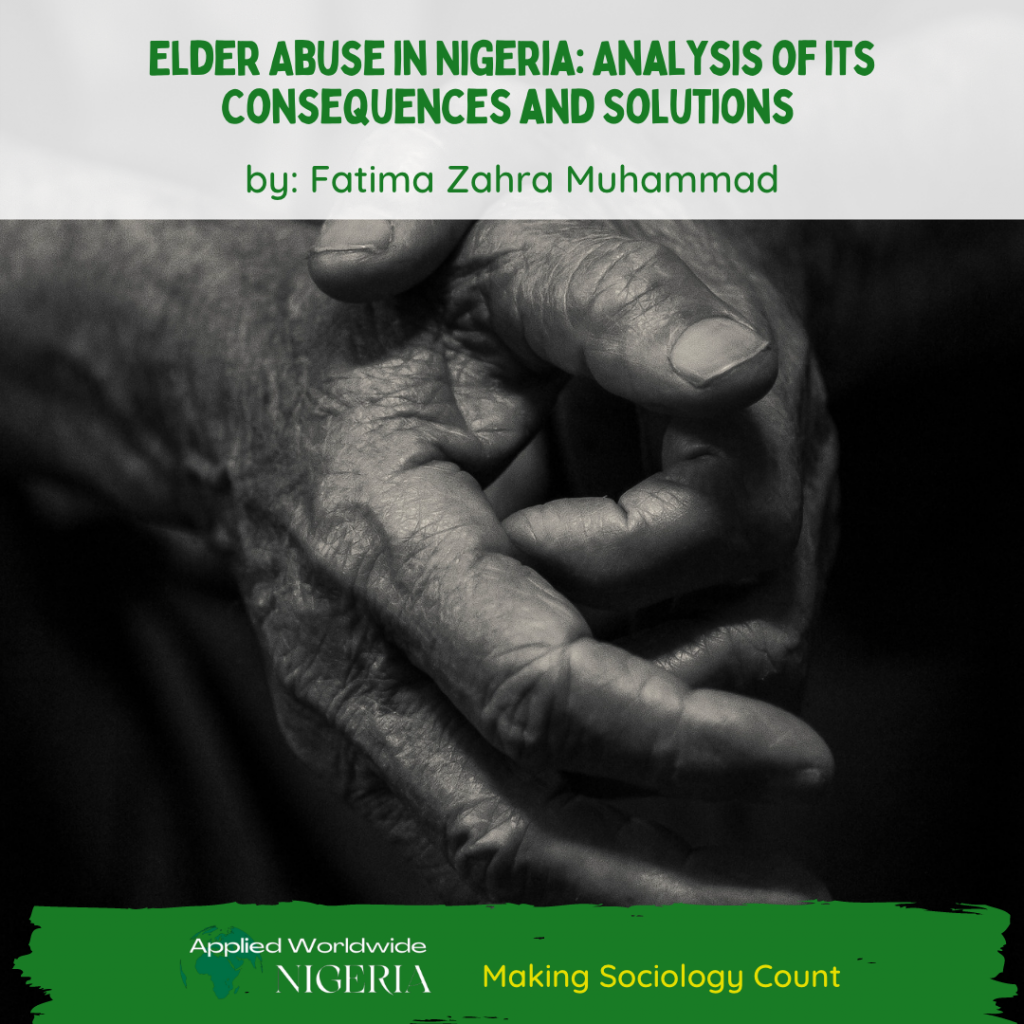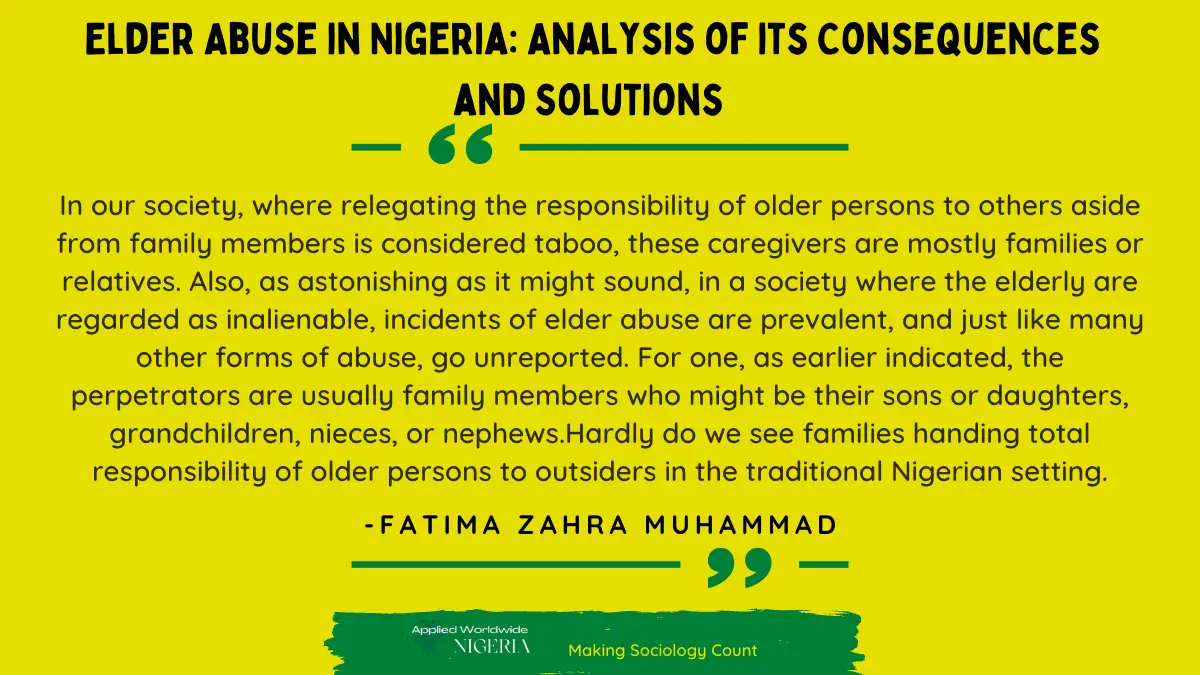“The World Health Organization (WHO) defines elder abuse as “a single or repeated act, or lack of appropriate action, occurring within any relationship where there is an expectation of trust, which causes harm or distress to an older person. This type of violence constitutes a violation of human rights and includes physical, sexual, psychological, and emotional abuse; financial and material abuse; abandonment; neglect; and serious loss of dignity and respect.” Elder Abuse constitutes all acts that cause harm or discomfort to older persons. These may include abandonment by caregivers, neglect, emotional abuse, physical assault, financial
abuse, or sexual exploitation.

An underlying fact about elder abuse is that it happens in circles where trust is established and whose aftermath causes the victim distress or any form of suffering.
In our society, where relegating the responsibility of older persons to others aside from family members is considered taboo, these caregivers are mostly families or relatives. Also, as astonishing as it might sound, in a society where the elderly are regarded as inalienable, incidents of elder abuse are prevalent, and just like many other forms of abuse, go unreported. For one, as earlier indicated, the perpetrators are usually family members who might be their sons or daughters, grandchildren, nieces, or nephews.
Hardly do we see families handing total responsibility of older persons to outsiders in the traditional Nigerian setting.
Just as is the case of child abuse, caregivers can also easily manipulate the dependency of older persons to their advantage. To their detriment, they face the risk of molestation, and neglect which in turn can affect their emotional and physical state of health.
Prevalence
To many, elder abuse seems more like a sham than a reality. This lack of acceptance by society is the reason why we have failed to establish the actual level of prevalence. As much as we might try to deny the fact, however, elder abuse happens.
According to the World Health Organization (WHO), the population of older persons will more than double from 900 million to 2 billion by 2050. This is predicted to lead to an increase in cases of elder abuse across the world. Based on this report, people aged 60 years or above will outnumber adolescents and young people aged 15–24 years by 2050. This growing number is also seen in countries such as Nigeria, where it is predicted that 80% of the world’s older population will live in less developed countries in 2050.
Consequences
In its global strategy on aging and health, the WHO obliges countries to protect the well-being of all stakeholders and minimize any foreseeable harm to other age groups. The strategy, which outlines approaches to healthy aging, seeks to foster longer and healthier lives for elder people. Based on the policy, the lack of proper mechanisms to protect older people from abuse could among other reasons affect their lifespan.
This means that increased abuse of elder persons in Nigeria not just affects their well-being, but has a great influence on how long they live. At a time when the world is struggling to enhance the quality of life across all ages, elder abuse if not addressed could stall this progress. When elder people are exposed to physical abuse, for example, they take a longer time to recover, unlike younger people. Acts of neglect or forced isolation could also lead to serious health challenges for older persons, affect their cognitive abilities, and can cause permanent disability.
Factors That Hinder Progress In Tackling Elder Abuse
Poverty
This factor could affect the ability of caregivers to adequately cater to older persons. In the Nigerian setting, poverty defeats the goal of supporting the elderly to live decent lives. For many of them, poverty has made street begging a full-time job. A report published in the International Handbook of Elder Abuse and Maltreatment says that Nigeria’s elder abuse scourge is affected by the challenges of poverty, high levels of unemployment among the youths, and poor economic and social support systems by the government.
Lack of awareness
There is presently a lack of awareness of elder abuse in Nigeria. Nigerians by way of tradition and religious values accord high status to older persons. An older person is regarded, not just by his immediate family as wise and experienced, but by the entire society. To insinuate that elders face abuse in a society that claims to respect them creates dissonance for many.
Victim’s Reluctance To Report Abuse
An underlying rule in addressing elder abuse is that victims need someone to step in for them. Victims of elder abuse face challenges of intimidation, which can prevent them from speaking out. Since they are mostly at the mercy of their caregivers, they are forced to suffer in silence because of their dependency on such people to do basic things on a day-to-day basis.
The Many Faces Of Elder Abuse In Nigeria
Elder abuse in the Nigerian setting could occur due to the actions or inactions of three players, majorly. These include the immediate community, the government, and most importantly, the caregivers.
Abuse By The Community
In North-Central Nigeria, Niger State to be precise, videos were trending on social media, of a purported ‘spiritual healer’ at work. In the dehumanizing video, elder persons most likely in their 70s and ’80s are stripped naked and whipped for practicing witchcraft. The healer, to your disappointment, is surrounded by onlookers, mostly young people who hail and encourage him to exert more of his punishment on the ‘witches causing problems in people’s lives.’ This is the commonest form of elder abuse in Nigerian society.
In a country where many do not give priority to issues of mental health, it is easier to admit that an aged person is a witch than to admit that they could just be suffering from dementia or another form of mental illness. This challenge, most commonly seen in rural areas, compounds the woes of the elderly amid the lack of essential healthcare services.
A study published in the International Network for The Prevention Of Elder Abuse observed that healthcare workers in rural areas would most likely avail their services to younger persons than the elderly persons “because they are suffering from old age sickness”.
The exasperating situation further affects the well-being of older persons some of whom could require healthcare services more frequently as they progress in age.
Abuse by the Government
The lack of social protection for the elderly in Nigeria further exposes them to abuse. On the part of the government, older persons who have served the government are entitled to social protection, also known as pensions most times suffer to access such benefits. For those without other support systems such as families or relatives, this pension becomes their only support system. What is practical in Nigeria however is continuous neglect of pensioners by the government. These elderly people spend the better part of their old age demanding their retirement benefits, which in many cases, is nothing to write home about.
This, on its own, is a form of stress and constitutes an act of abuse of older persons by the Nigerian government. Even when the government decides to pay them, they are forced through stressful processes not befitting the elderly. Those without such benefits have it harder at a time when the cost of living has become mind-bogglingly high.
By the family/ caregivers
This is the commonest form of elder abuse. Abuse by caregivers in Nigeria ranges from physical, emotional, and even sexual. On the streets of many towns in Nigeria, elderly persons are a common sight. This, for whatever reason, is regarded as neglect and abandonment. Many caregivers also lack the knowledge of how to deal with older persons and either intentionally or not, end up abusing them. Elderly persons could sometimes face verbal abuse, physical assault, forced isolation, or poor
management of their health by caregivers. A caregiver failing to feed an elderly person, or failing to provide medication as required all account for acts of abuse.
Addressing Menace
Nigeria recently started working on developing a policy on aging, in line with the recommendation by the United Nations. Two years ago, the Federal Government approved a National Policy on Ageing and signed the National Senior Citizens Centre Act 2017. The policy was geared towards improving the lives of senior citizens in Nigeria. This also led to the establishment of the National Senior Citizens Centre, an agency saddled with the responsibility of coordinating the activities of older persons in Nigeria.
For inclusiveness, the federal government had directed that the Act be domesticated across all states for the betterment of all older persons.
The policy targets the strengthening of traditional support systems for older persons. It also sought the establishment of the framework for the regulatory mechanism on aging issues. This is in addition to enabling adequate and sustainable income, security, and healthy aging.
With these actions, the federal government only just started its quest to equip older persons. There is still much needed to be done in strengthening the welfare of older persons. For one, recent alterations in the family structures also call for the establishment of more formal structures that will cater to the needs of the elderly.








